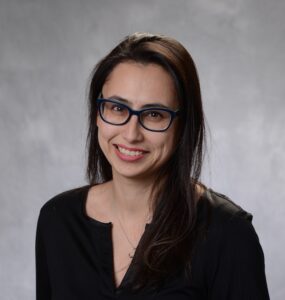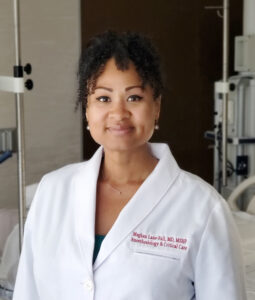Southeastern Critical Care Summit Program
2023 Summit Program
Dr. Elizabeth Viglianti will lecture on Persistent Critical Illness: Improving Risk Prediction
Dr. Elizabeth M. Viglianti is an Assistant Professor in the Division of Pulmonary and Critical Care at the University of Michigan and is the Equity Science Lead for the Department of Internal Medicine at the Veteran Affairs Hospital in Ann Arbor. She completed her undergraduate studies at the University of California at Berkeley, her M.D. from Duke University School of Medicine, her M.P.H from the University of North Carolina at Chapel Hill, and her M.Sc. from the University of Michigan in parallel with her residency and pulmonary critical care medicine fellowship. Dr. Viglianti’s research focuses on improving the care of vulnerable populations, either from physiologic derangements or social reasons, and on the experience of and organizational response to patient-perpetrated sexual harassment. She also conducts research to understand the evolution of persistent critical illness and identify evidenced-based gaps in patient care that may be addressed to change the clinical trajectory to one of recovery.
_
_
Dr. Meghan Lane-Fall will lecture on Diversity and Inclusivity in Critical Care Medicine
Dr. Meghan Lane-Fall is a perioperative implementation scientist and practicing anesthesiologist and intensive care physician. At the University of Pennsylvania, she is the Executive Director of the Penn Implementation Science Center at the Leonard Davis Institute of Health Economics. Her research focuses on the application of implementation science to improve patient safety and communication in perioperative and critical care settings, but she has also conducted research on recovery after critical illness. She serves as the David E. Longnecker Associate Professor and Vice Chair of Inclusion, Diversity, and Equity in the Department of Anesthesiology and Critical Care, with a secondary faculty appointment in epidemiology. Dr. Lane-Fall is also Vice President of the Anesthesia Patient Safety Foundation and is on the Board of Directors of the Foundation for Anesthesia Education and Research.
- Cardiogenic shock? (S. Hollenberg)
- Mechanical circulatory support / ECMO (S. Dave)
- Lethal arrhythmias in the ICU (M. Lloyd)
- What’s bugging you now? New antibiotics and MDROs (J. Corbino)
- New diagnostics / biomarkers (A. Mehta)
- Climate change for new and emerging infections (A. Piantadosi)
- Persistent Critical Illness: Improving Risk Prediction (Dr. Elizabeth Viglianti, University of Michigan)
- Pro/Con: Cooling is still cool! (C. Albin)
- Pro/Con: Cooling is still cool…or is it? (C. Hall)
- Broken Brain: Neuroprognostication in the ICU (E. Lawson)
- Conservative vs. Liberal: The politics of fluid resuscitation (S. Bhavani)
- Steroids in Sepsis and ARDS: Is there a correct answer? (P. Yang)
- IABP/Impella: Considerations in a community hospital (R. Johnson)
- Shocking diagnostic dilemmas (A. Bostic)
- Rising pressures: managing refractory shock (M. Marll)
- Challenging ICU ethical dilemmas (E. Sivertsen)
- The perfusion confusion: Enteral nutrition and vasopressors (L. Barlow)
- Fluid responsiveness in the ICU (V. Capric)
- Hemodynamic Effects of Positive Pressure Ventilation? (J. Wang)
- What is neurostorming and what do I do? (J. Ratcliff)
- To wean or not to wean: midodrine for vasopressor weaning (E. Etter)
- Myth busting the midline catheter (S. Elmore)
- The art of giving effective feedback (A. Hodson)
- Year-in-review: Medical Critical Care (M. Kang)
- Year-in-review: Cardiovascular Critical Care (L. Sridharan)
- Year-in-review: Neurological Critical Care (O. Sadan)
- Diversity and Inclusivity in Critical Care Medicine (Dr. Meghan Lane-Fall, University of Pennsylvania)
1:35 – 2:35 Breakout session # 1
- Basic / advanced mechanical ventilation (Bender, Echols, Regis, Williams, Osen)
- POCUS and ICU ultrasonography: cardiac and vascular/DVT (Mehta, Hunt)
- Hemodynamic monitoring technologies (Holder, Marts)
- Vascular access simulation (Tekwani)
- Case-based ECMO(Dave)
This course is intended for critical care physicians, medical directors, nurses and clinical nurse specialists, critical care pharmacists, nurse managers, respiratory therapists, dieticians, rehabilitation specialists and NP and PA providers. This activity has been planned and implemented in accordance with the accreditation requirements of the Accreditation Council for Continuing Medical Education through the joint providership of the Ochsner Clinic Foundation and the Southeastern Critical Care Summit. The Ochsner Clinic Foundation is accredited by the ACCME to provide continuing medical education for physicians and the Ochsner Clinic Foundation is expected to designate the 2023 live activity for a maximum of 11.75 AMA PRA Category 1 Credits.™ Physicians should claim only the credit commensurate with the extent of their participation in the activity. The Southeastern Critical Care Summit is also planned to award contact hours by the American Nurses Credentialing Center (ANCC) and the Accreditation Council for Pharmacy Education.
Instructions for obtaining educational credits is available in this document.
Click here to watch lectures from prior Critical Care Summits!
Please check back often for additional information, follow us on Twitter using @SummitCritCare and#SECCS23, see prior talks and plenary lectures on our YouTube Channel, like us on Facebook, or contact us for updates about Summit 2023 registration!
Disclosure
The Ochsner Clinic Foundation relies upon invited speakers at all sponsored continuing medical education activities to provide information objectively and free from bias of conflict of interest. In accordance with ACCME and institutional guidelines pertaining to potential conflicts of interest, the faculty for this continuing medical education activity has been asked to complete faculty disclosure forms. In the event that some invited speakers indicate that they have a relationship which, in the context of the subject of their invited presentation, could be perceived as a potential conflict of interest, their materials have been peer reviewed in order to ensure that their presentations are free of commercial bias.